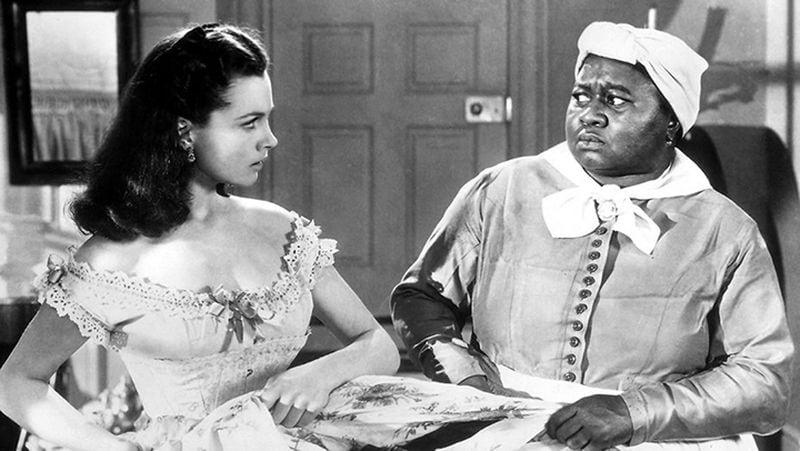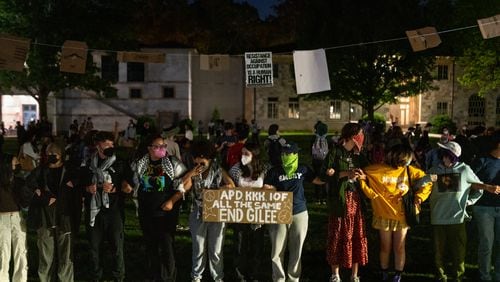When Hattie McDaniel won the Academy Award for best supporting actress on Feb. 29, 1940, for her role as “Mammy” in the epic Civil War movie “Gone with the Wind,” she was already one of the biggest African American movie stars, having had roles in at least 67 films before her Oscar-winning performance.
She starred alongside major Hollywood heavyweights of the time, including James Cagney, Jean Harlow, Barbara Stanwyck, Joan Crawford and Ronald Reagan. Reports say she was good friends with Shirley Temple.
Although she was the first African American actor to be nominated and win an Academy Award, the moment was viewed as more of a personal victory for McDaniel rather than an historic achievement for the black community. Many thought McDaniel had been typecast in subservient roles that perpetrated many difficult-to-accept racial stereotypes.
Reports say even the NAACP disavowed her.
In “Gone with the Wind,” she played an opinionated, headscarf-wearing slave maid, emblematic of the Old South.
Throughout her career, McDaniel had to continually defend her decision to play the roles, once saying, “Why should I complain about making $700 a week playing a maid? If I didn’t, I’d be making $7 a week being one.”
She was also criticized because she seemed to deliberately avoid speaking on politics or participating in social causes for civil rights. McDaniel did, however, join the Negro Actors Guild of America late in her career.
That was 80 years ago, during the Golden Age of Hollywood, but more notably it was during the height of the Jim Crow era, when laws everywhere around the country promoted racial segregation and the disenfranchisement of black people.
McDaniel wasn't allowed to attend the Dec. 15, 1939, Atlanta premiere of the movie at Loew’s Grand theater on Peachtree Street, a fact recalled in modern popular culture, such as in the 2006 song “Blunt Ashes,” in which rapper Nas exclaims:
"Yo, man, I ... start thinking 'bout Hattie McDaniel got an Oscar For playing Mammy in 'Gone with the Wind' And she didn't get allowed Wasn't even allowed to go to the premier Believe that? Couldn't go to the premier, to her joint Man, you know they were strong back then, man ..."
It was said that her co-star in the film, actor Clark Gable — then known as “The King of Hollywood” — threatened to boycott the premiere unless McDaniel was allowed to attend, but McDaniel reportedly talked him out of the protest.
McDaniel, however, was allowed to attend the Hollywood debut on Dec. 28, 1939, and then the Oscars gala on Feb. 29, 1940, at the Cocoanut Grove nightclub inside The Ambassador Hotel in Los Angeles.
The Ambassador had a strict “no-blacks” policy.
According to historical accounts, Hollywood producer David O. Selznick arranged for McDaniel to be allowed into the hotel as a favor. Once inside, McDaniel was seated with an escort at a small table across the room from Gable and her other castmates including Vivien Leigh and Olivia de Havilland, who was also nominated in the same category as McDaniel.
McDaniel arrived in a rhinestone-studded turquoise gown with white gardenias in her hair, according to The Hollywood Reporter.
She was introduced at the ceremony by actress Fay Bainter, who called on the audience to stand and salute McDaniel.
The crowd erupted in cheers as McDaniel made her way to the stage at the 12th Academy Awards.
»Click here to get the new AJC Mobile App
In her acceptance speech, McDaniel spoke swiftly from the heart, expressed deep humility and wiped away tears as she left the dais.
“Academy of Motion Picture Arts and Sciences, fellow members of the motion picture industry and honored guests: This is one of the happiest moments of my life, and I want to thank each one of you who had a part in selecting me for one of their awards, for your kindness. It has made me feel very, very humble; and I shall always hold it as a beacon for anything that I may be able to do in the future. I sincerely hope I shall always be a credit to my race and to the motion picture industry. My heart is too full to tell you just how I feel, and may I say thank you and God bless you.”
Twenty-four years would pass before another African-American actor, Sidney Poitier, took home the prize for best actor in 1964.
Hattie McDaniel was born on June 10, 1895, in Wichita, Kansas. She was the youngest of 13 children.
Her parents were freed slaves, and her father fought in the Civil War.
Sam McDaniel, her brother, was also an actor, which opened the door for Hattie in her early career. She followed him on a traveling comedy troupe, and then to Los Angeles, where she worked menial jobs while writing and singing songs, and appearing on sketch comedy radio shows, beginning in the late 1920s and then throughout the 1930s.
This coincided with her entry to the film industry around 1932 and she quickly earned a reputation as a comedic actress. She didn’t get a screen credit for some of her first roles, but appeared in an unprecedented nine films the year of her debut.
When it came to the part of Mammy, accounts say she went to the audition dressed in an authentic maid’s uniform and won the part outright.
She was 44 years old at the time.
After her death, McDaniel’s Oscar was given to Howard University, where it went missing during the civil rights protests of the 1960s.
To this day, the award remains missing.
McDaniel died on Oct. 26, 1952. She is buried in Angelus-Rosedale Cemetery in Los Angeles.
She has two stars on the Hollywood Walk of Fame: one for radio and one for film.
Since McDaniel’s win, only 16 more black actors have taken home the Oscar for either a leading or supporting role, and only eight black women, including McDaniel, have won the best supporting actress category in the 92-year history of the Academy Awards.
Here is a full list of African American actors who have won Academy Awards since McDaniel’s historic win, by year:
- 1964 — Sidney Poitier, "Lilies of the Field"
- 1983 — Louis Gossett Jr., "An Officer and a Gentleman"
- 1990 — Denzel Washington, "Glory"
- 1991 — Whoopi Goldberg, "Ghost"
- 1997 — Cuba Gooding Jr., "Jerry Maguire"
- 2002 — Denzel Washington, "Training Day"
- 2002 — Halle Berry, "Monster's Ball"
- 2005 — Jamie Foxx, "Ray"
- 2005 — Morgan Freeman, "Million Dollar Baby"
- 2007 — Forest Whitaker, "The Last King of Scotland"
- 2007 — Jennifer Hudson, "Dreamgirls "
- 2010 — Mo'Nique, "Precious"
- 2012 — Octavia Spencer, "The Help"
- 2014 — Lupita Nyong'o, "12 Years a Slave"
- 2017 — Viola Davis, "Fences"
- 2017 — Mahershala Ali, "Moonlight"
- 2019 — Mahershala Ali, "Green Book"
- 2019 — Regina King, “If Beale Street Could Talk”
About the Author






